We all know that traveling can throw your healthy eating and exercising game off. It’s a delicate balance between wanting to indulge a little bit (after all, you’re on vacation!) and wanting to maintain a routine and good habits. Even when traveling with kids, the last thing you want to do is let them eat garbage all day long only to fight them when you come home and want to re-establish good eating habits again. Also, staying healthy while traveling isn’t just about eating nutritious food. It’s doing your best to avoid illness as well. Particularly when traveling to foreign countries, it’s especially important to take precaution and be armed with some tools to help you combat any illness or diseases you come across.
So, we’ve put together a list of 11 tips for staying healthy while traveling. These tips have made a big difference and know will they will help you too. (*Note: There is no 100% guarantee you won’t get sick following these tips, but they will certainly help minimize your risk.)
*This post contains affiliate links, which means we receive a small compensation if you make a purchase clicking the links.
1. Incorporate exercise everyday
Make it a priority to exercise when you’re traveling, even if that means a quick 15 min workout in your hotel room, a brisk walk in a park, a bike ride, an online yoga routine, etc. Sounds like common sense, right? But in actuality, most people take a break from exercising when on vacation. Keeping active is important not only for your body, but for your immune system too. Our favorite exercises combine multiple muscles together to get a total body workout in a short amount of time. You can find great (short) total body workouts on many kinds of apps.
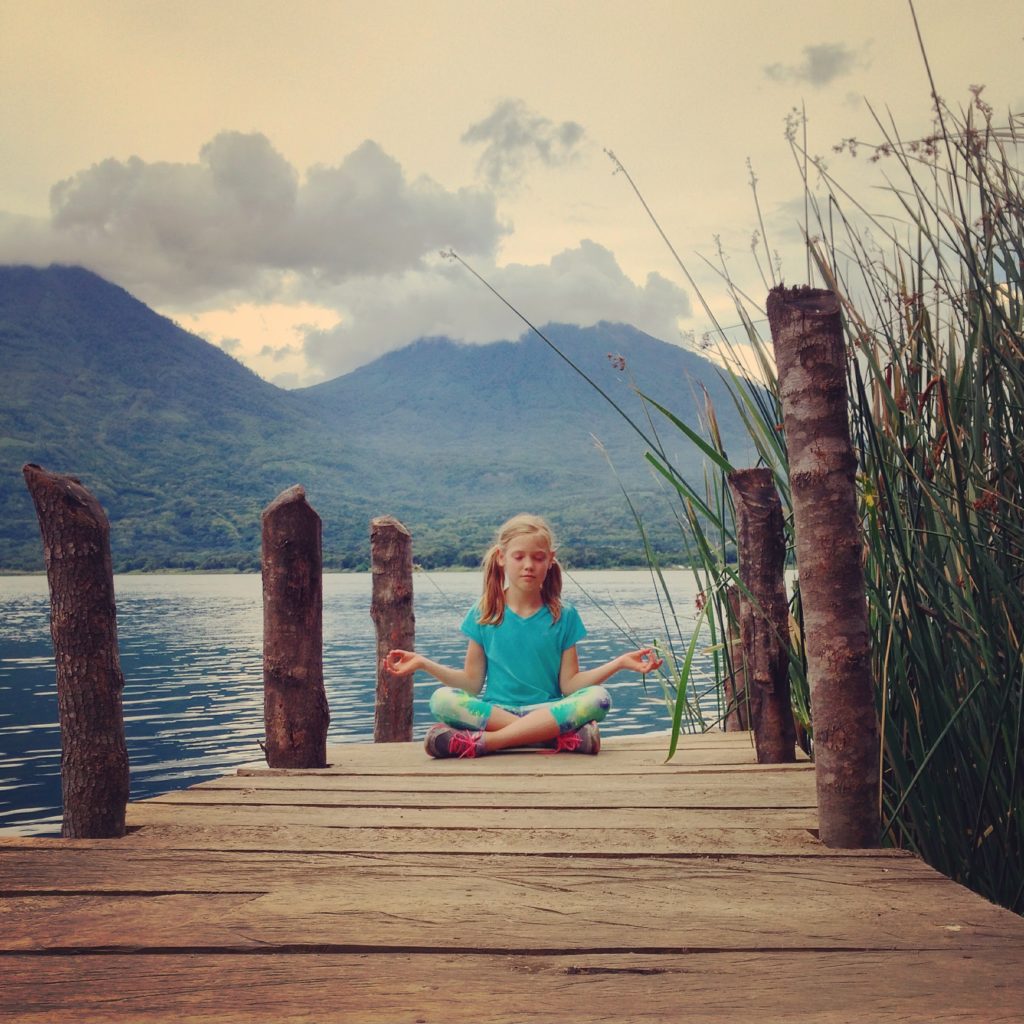
Namaste in Guatemala
One of our favorite workout apps is 12 Minute HIIT because for most of the exercises, no equipment is necessary making this a great alternative to the gym when traveling. Great total body workouts designed in 12 min! I also love Jefit and MyFitnessPal (which is our favorite for tracking food too). There are many great instructional yoga apps too which makes yoga easy to do on the road. We personally love Pocket Yoga and Daily Yoga.
One of our favorite exercise items to bring with us traveling are TRX straps because there are endless exercises you can do with them (talk about a total body workout!), they pack light, and all you need is a door frame to anchor them. We can’t travel without these! We also love a GoYoga mat, which is also essential on the road.
2. Pack your own snacks
This might seem simple, but it’s a biggie. Not only will this save you money in the long run, but packing your own snacks can save you from eating too many treats on the go and on the road. Head to the grocery store and market when you first arrive in town and stock up on your favorite healthy snacks (or bring them with you on your carry-on). We love fresh fruit (such as apples), whole food and protein bars, trail mix, nuts, dried fruit, jerky, etc. We love this healthy snack pack because you get such a good variety and can even sign up for the monthly subscription to get the best deal!
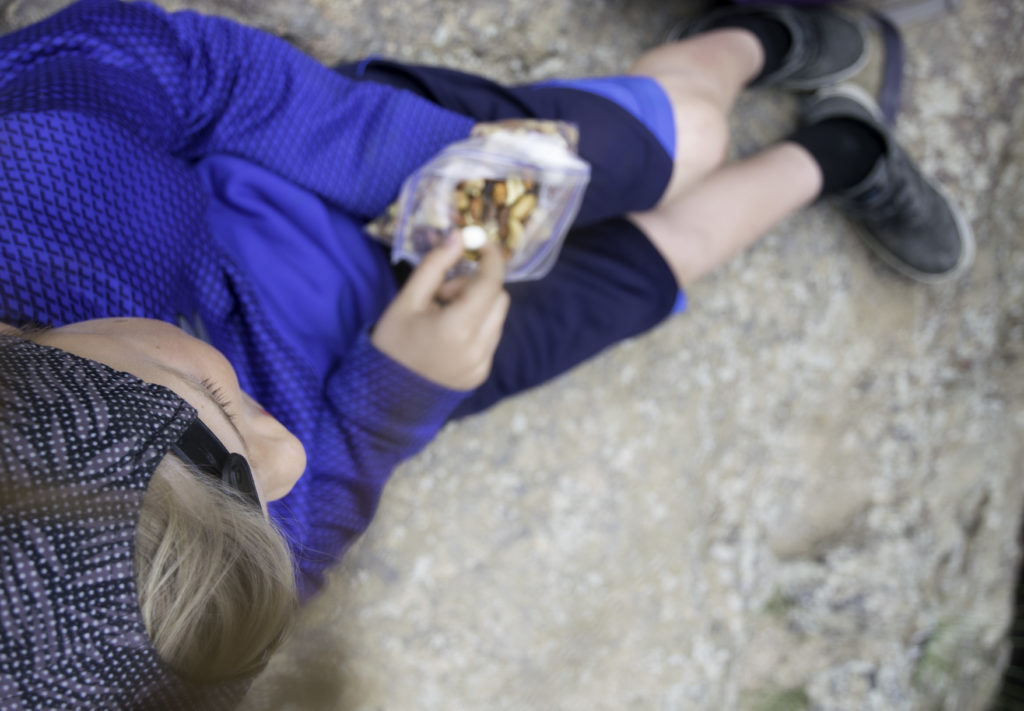
We love making our own trail mix
3. Eat at least one fresh meal a day
For us, breakfast or lunch is the best meal to try to eat fresh while traveling. Of course, when you’re traveling, you want to be able to indulge a little and try the local food fare, but you also don’t want to eat too many heavy foods. Also, if stay in an Airbnb, usually you will have a kitchen you can purchase food at a market and cook for yourself. This is probably one of our #1 tips as far as eating and traveling goes.
It’s expensive to eat out as a family for every meal, so we try to stay in a place with a kitchen of some sort so that we can save on money and eat fresher and healthier. If that it’s an option, try to choose healthier restaurants and opt for vegetarian meals, grilled options over fried and of course, choose a salad (my favorite option for eating out) Don’t skip breakfast too!
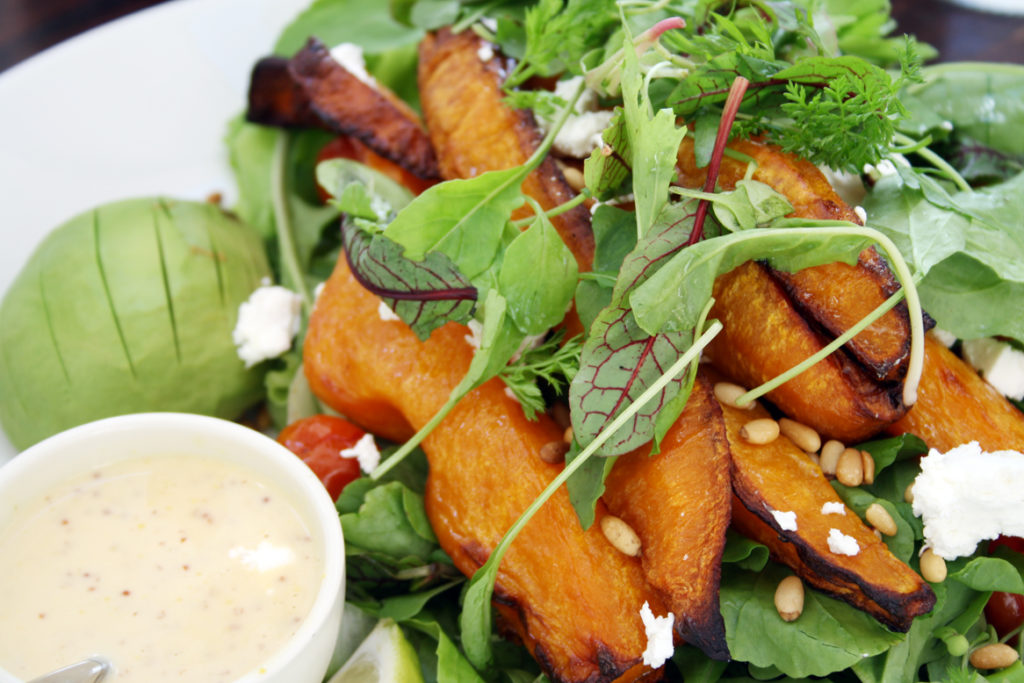
Photo courtesy of Saaleha Bamjee via Creative Commons.
4. Smart sleeping habits
This might seem obvious but most people don’t sleep enough (or sleep smart) when they’re traveling, especially overseas. The most important thing you can do while traveling is sleep. Your body needs adequate rest when you’re traveling, crossing time zones, carrying luggage to and from destinations, walking all day, etc. As far as jet lag goes, one of the best ways to reduce its effects is to get on the local time schedule before you leave. A few days before you fly to your destination, start to go to bed closer to your destination’s time zone.
If it’s five hours later where you’re headed, go to bed an hour or two later and wake up the next day an hour or two earlier. Doing this for just two or three days prior to your departure can really make a difference and give your body a boost upon arrival. If it helps, even set your clocks ahead at home a few hours to help your body pre-adjust. Adjusting to a new time zone with kids can be even harder, and you have to be more flexible but these tips below can help with kids too.
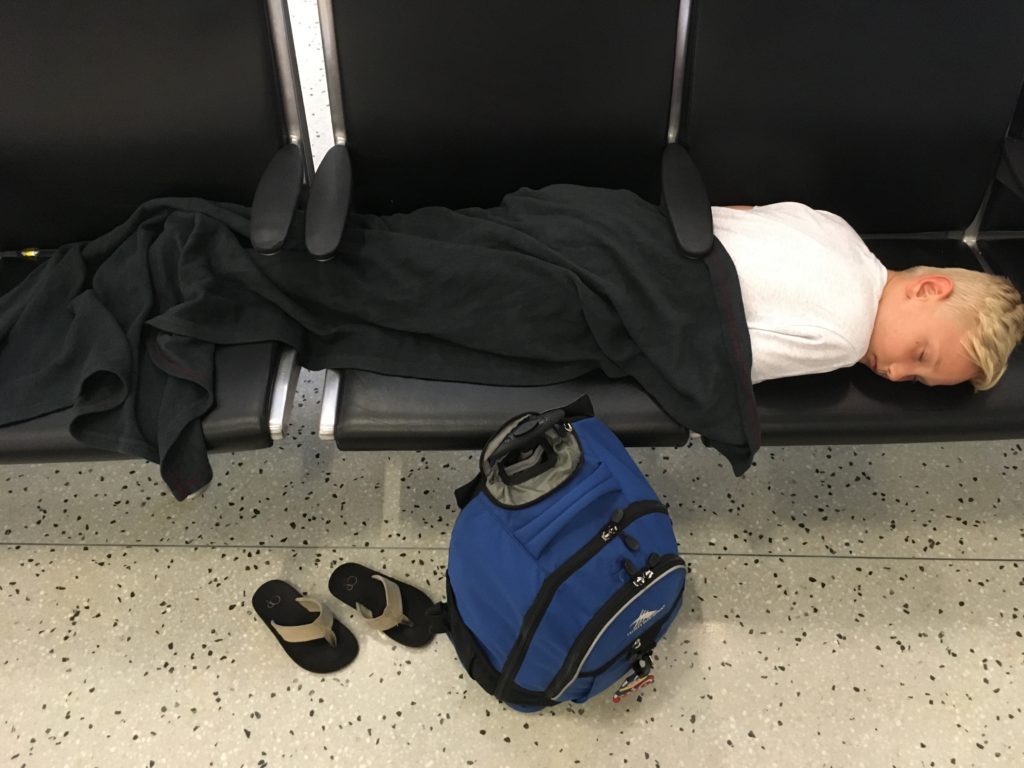
Here are some other helpful tips:
- Drink plenty of water before and during your travel. Dehydration makes it more difficult for the body to adjust to a new rhythm. Also, avoid excessive caffeine, alcohol, and tobacco.
- Limit your sleep to no more than two hours after arrival.
- Take a one-hour walk as soon as you get up in the morning.
- Eat a meal when you’re hungry (even if it’s not during a normal time for you to eat while flying).
- Try to sleep on the plane if you if you can. We are obsessed with this new ergonomic travel pillow! If you have a young toddler or baby, this Baby Nook pop-up tent is a great item to carry with you for airport layovers, and even just wherever you are staying at your destination (much more compact than a portable crib too!)
- Avoid social isolation.
- Take time for exercise and a good night’s sleep BEFORE the flight.
- Stay awake until 11PM at your destination. Even if you’re dying for a nap, try to resist the urge to sleep and stay active with exercise and/or conversation until you pass the 11PM point. This will put you immediately on the timezone of your destination.
- Take a hot, relaxing bath if you find yourself unable to sleep upon arrival in your new destination (if it’s at night). Herbal teas can help relax you too.
- Get up at a normal morning hour the next morning after flying and work through the day without napping. By the time you reach 11PM, your body should be closer to adjusting your sleep cycle.
- Take a natural remedy such as time-release Melatonin to help you to fall asleep, as well as get quality sleep. Melatonin is completely safe for kids too! Also, lavender essential oil is a great aide at calming the mind and the body to allow for more restful sleep.
5. Know before you go
Planning ahead before traveling will save you big time on keeping healthy habits while traveling. Before you go, research healthy restaurants in your destination and/or know what supermarkets you can shop at if you will be cooking at all.
6. Bring a reusable water bottle

If you get in the habit of carrying a reusable water bottle around, you are more likely to drink more water and stay hydrated. If you are in a foreign country where the water isn’t safe to drink, there are some great options for water bottles that have a built-in filter in them (or this Sawyer portable water filtration system), to make your water safe to drink. We are also obsessed with Hydroflasks because not only are they re-usable and made with stainless steel, but they keep your water cold for 24 hours (or hot!).
7. Travel light
This can be tough sometimes, but can save you muscle and back aches in the long run having to lug around heavy luggage. Try to pair down what you need to bring on your trip by just bringing the essentials (don’t forget good walking shoes most importantly!) and if you know you can get to a laundromat during your travels, utilize it so you don’t have to bring so much clothing. We also love packing cubes to help you organize your luggage as well as store more.
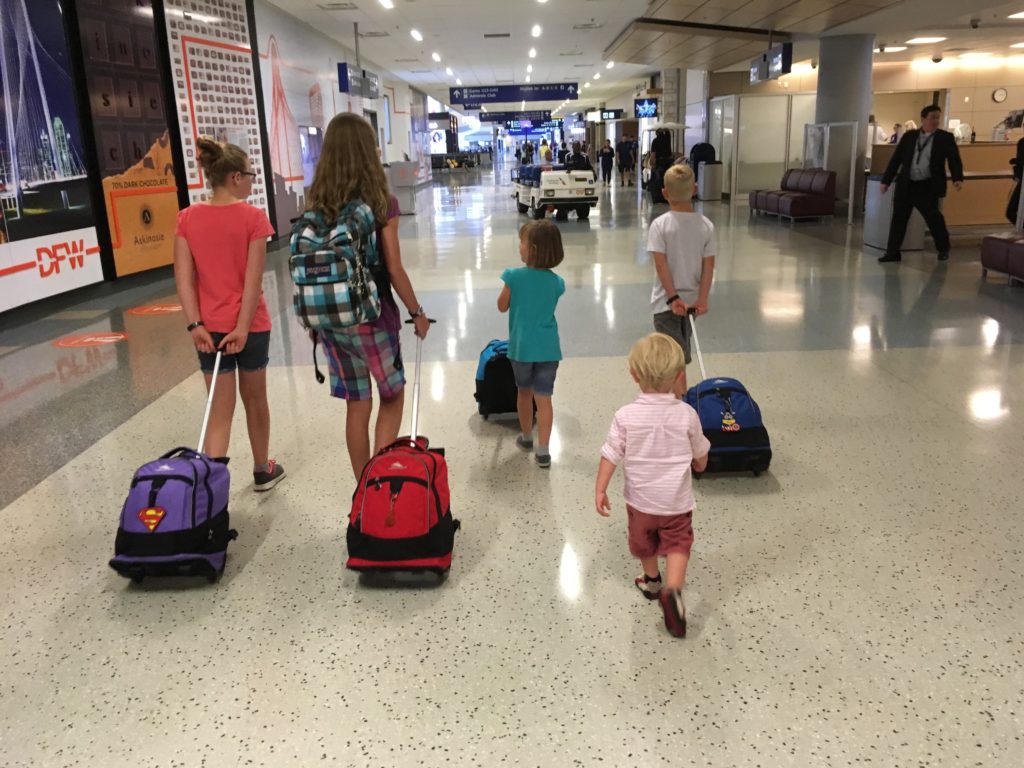
8. Utilize natural remedies
There are so many great remedies out there to combat illness, stomach issues, sleep, and more. If you take vitamins and supplements on a regular basis, there’s no reason to stop when you travel. Continue to take them as to help boost your immune system (along with the other tips mentioned) to hopefully help prevent any sickness. Probiotics are especially important as they boost gut health, which is essential when you’re traveling somewhere new and eating foreign foods. We love a kid-friendly chewable probiotic as well.
9. Make sure your vaccinations and immunizations are up to date
If you need any immunizations or vaccinations, make sure to see your doctor at least 6 weeks before you leave the country since some vaccines don’t reach the highest protection until about 6 weeks after you get the shots. Some vaccinations you might need could include: Hepatitis A and B, Influenza, Measles/mumps, Meningococcal meningitis, Pneumococcal, Polio, Rabies, Tetanus and Diphtheria, Typhoid, Varicella, Yellow Fever, and Malaria.
10. Protect your skin
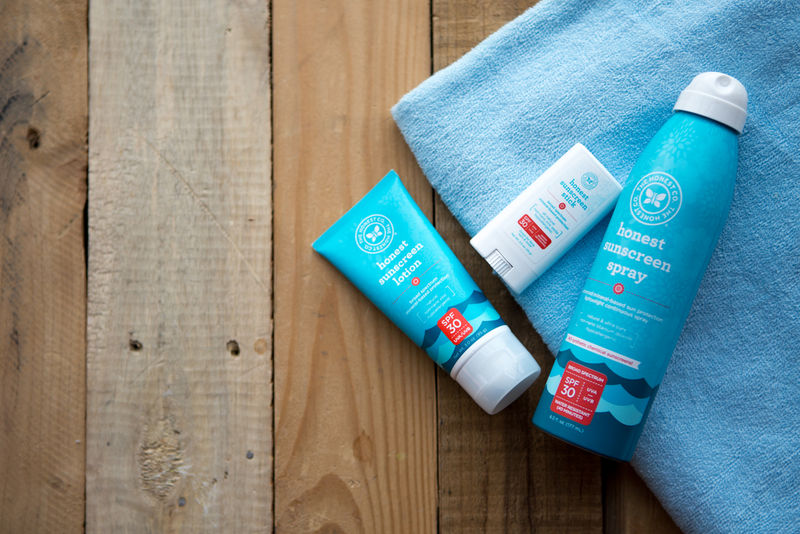
Photo courtesy of Trend Hunters.
No matter where you are traveling to, make sure you bring sun protection in the form of sun protective UVA/UVB clothing, sunglasses, and sunscreen. Sunscreen should have at least 6% zinc oxide and/or titanium oxide as the active ingredient (these ingredients carry the most protection and act as a physical barrier on the skin). They are also minerals and not chemicals, so they are safer for your skin and the environment. Also, try to wear rash guards (or UVB/UVA clothing) in the water which will offer the best protection and minimize risk to environment.
We love Babo transparent zinc-based sunscreen, as well as a sunscreen safe for coral reefs and places where marine life resides. This Badger bug-repellent sunscreen is a wise idea too, if you are going somewhere there are a lot of mosquitoes. See what kind of sunscreens make the top of the list for safety and effectiveness.
11. Wash your hands often
This seems like a no-brainer but might be your best protection to staying healthy while traveling. Think about the amount of germs lurking around just in the airport and airplanes alone where so many people touch such as door handles, dining trays and tables, ticket kiosk, ATM, security-line bins, etc. If you can’t wash your hands often, carry hand sanitizer with at least 50% alcohol or take disinfecting wipes with you. If you can’t wash your hands often, at least be mindful of not touching your hands to your nose and mouth.
